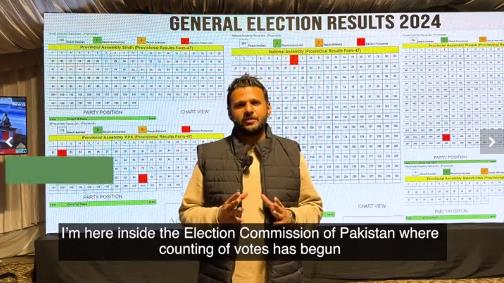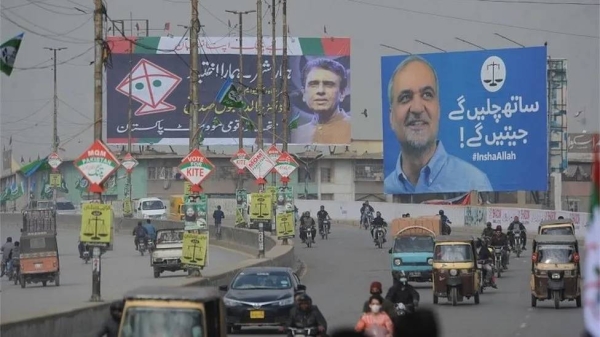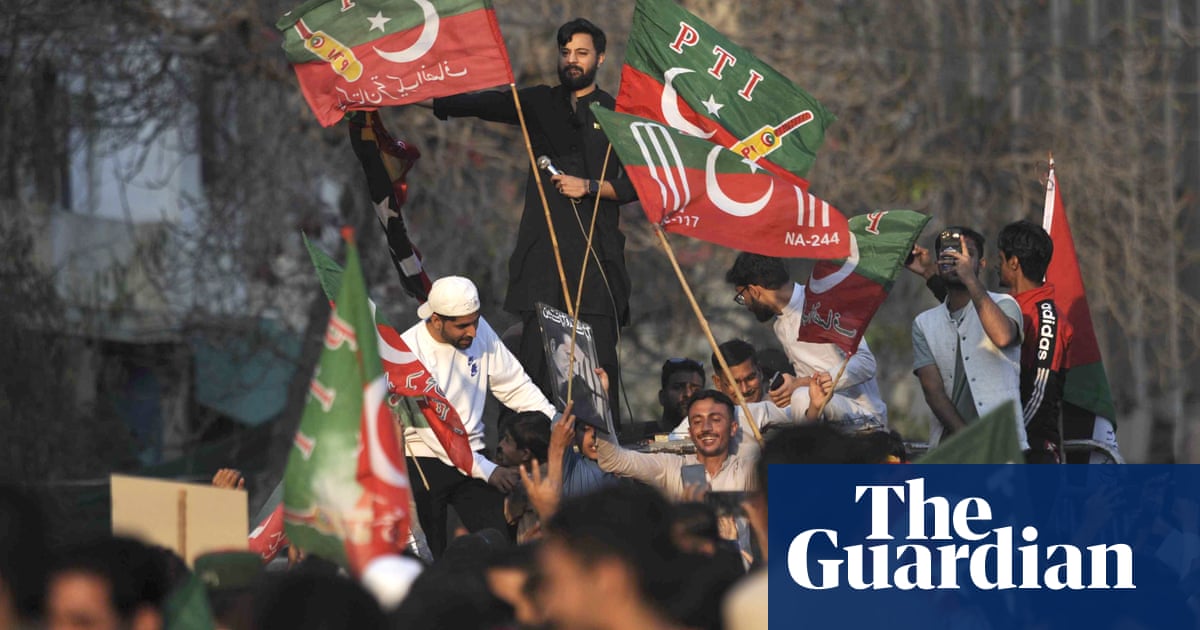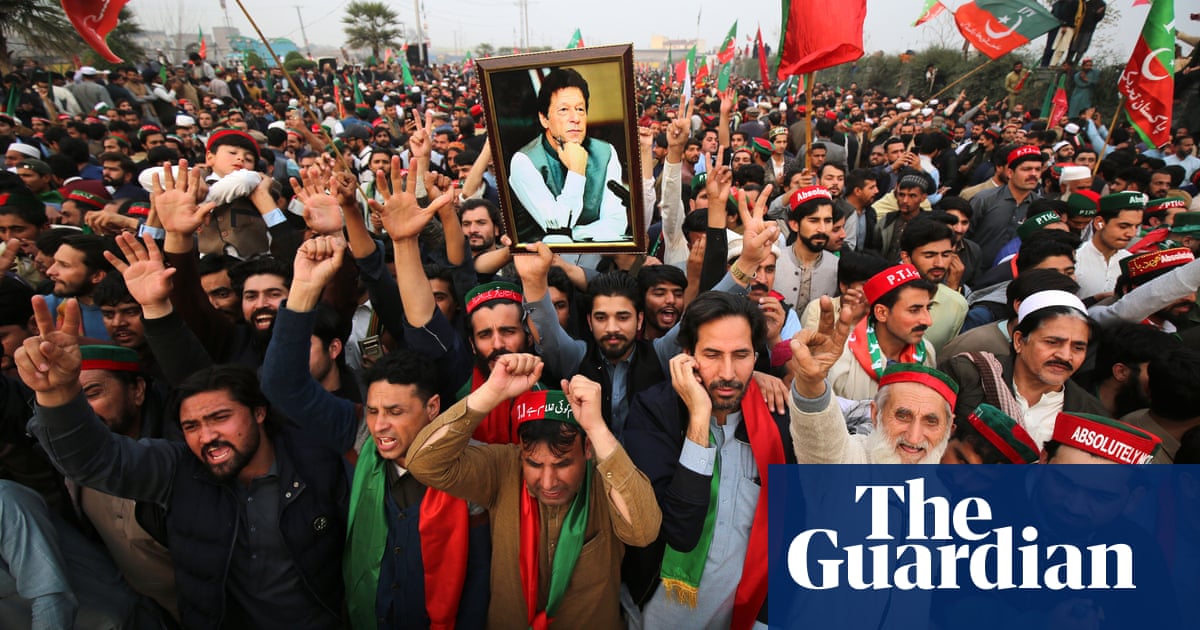
A clear picture is likely to emerge early on Friday as counting continues through the night
At least nine people killed in multiple attacks in Balochistan, Khyber Pakhtunkhwa provinces
ISLAMABAD: Pakistan began counting votes after polling ended on Thursday in a closely watched general election that laid bare the turbulent state of the South Asian nation’s politics, with the vote tainted by militant attacks, suspended mobile phone services and allegations of rigging and disarray at polling booths.
Thursday’s vote was the culmination of an especially contentious election season in which allegations of military meddling took center-stage, casting a shadow over a historic event that marks only the country’s third-ever democratic transition of power. The army, which has ruled for over three decades of Pakistan’s history since independence in 1947, strongly denies interfering in political affairs.
The government’s decision to suspend mobile data services across the country minutes before voting began was also seen by many as an effort to keep opposition voters from getting information or coordinating activities, but the interior ministry said it opted for the blockade to ensure the security of polling stations after at least 28 people were killed in two explosions near election offices in the southwestern province of Balochistan on Wednesday.
Networks only began to be restored in some parts of the country more than three hours after voting ended.
On Thursday, at least nine people, including two children, were killed in a number of attacks in the Balochistan and Khyber Pakhtunkhwa provinces.
In the rest of the country, things remained calm though there were reports of delays in the opening of some polling stations and voters complained of mismanagement.
“On the conclusion of the process of polling for General Elections 2024, I announce with immense satisfaction that the overall security situation across the country was kept generally stable to ensure the peaceful conduct of free and fair elections,” Interior Minister Dr Gohar Ejaz said in a statement.
“Despite a few isolated incidents, the overall situation remained under control, demonstrating the effectiveness of our security measures.”
Experts said the election was largely peaceful.
“This is the first election in Pakistan"s history that has remained remarkably peaceful, with only a few minor incidents considering the scale of the event,” said Kanwar Dilshad, a former secretary of the election commission.
“The closure of mobile phone signals did not significantly impact turnout, wherever I went in [city of Lahore], there were long queues of voters waiting patiently … There have been no signs of rigging or intimidation on election day.”
Ahmed Bilal Mahboob, a foremost election expert in Pakistan, said the mobile network shutdown was “understandable” given security concerns:
“But I don’t think it made a major impact on the fairness of elections.”
“CLOSE FIGHTS”
The election comes at a time when the Pakistani economy is beset by record high inflation, falling foreign exchange reserves, a depreciating currency, low consumer confidence and slow growth caused by tough reforms carried out to meet the conditions of a last-gasp $3 billion bailout from the International Monetary Fund (IMF) approved last year.
Tensions between civilian politicians, particularly from the Pakistan Tehreek-e-Insaf (PTI) party of jailed former Prime Minister Imran Khan, and the powerful military, also ran high as millions of Pakistanis went out to vote.
Khan, arguably the central pole of Pakistani politics, was missing from Thursday’s elections, as he has been in jail since August last year and is also disqualified from running for public office for ten years. The former premier was convicted in three back-to-back cases this month and faces dozens of other legal challenges, including one case in which he is accused of ordering violent attacks on military installations on May 9, 2023, which could entail the death sentence. Khan says all the cases are politically motivated to sideline him and his party from elections.
In the run-up to the polls, Khan’s PTI complained of a widening crackdown against the party, including not being allowed to campaign freely, and analysts questioned the legitimacy of an election that Khan, the main opposition leader and arguably the country’s most popular politician, was not allowed to contest.
Khan’s key challenger is the Pakistan Muslim League-Nawaz (PML-N) party of three-time former Prime Minister Nawaz Sharif, who returned to Pakistan last year from self-imposed exile to lead the party ahead of national elections.
Sharif’s last three terms as prime minister in 1990-93, 1997-99, and 2013-17 ended before he could complete his tenures, as he was removed by a military-backed president in 1993, ousted in a military coup in 1999, and disqualified by the Supreme Court in 2017.
His political fortunes have risen and fallen on his relationship with the military, with which he has repeatedly fallen out after reportedly pushing for more civilian control in government, only to find himself once more in its favor time and again.
In the last election in 2018, it was Sharif’s PML-N that widely complained of rigging and manipulation. A year earlier, Sharif had been ousted by the Supreme Court as prime minister and disqualified for life from running for public office. He later left for the United Kingdom after being granted medical bail and declined to return.
But as he came back to Pakistan in October last year, corruption cases against him evaporated and the bar against contesting in polls was lifted. Sharif is now widely seen as the frontrunner in elections, with an edge over rivals due to the backing of the military.
The PML_N leader has denied the generals have thrown their weight behind him or that the results of the election are pre-decided.
TV channels started making projections of first results after voting closed at 5pm but a clear picture is likely to emerge early on Friday as counting continues through the night. The Election Commission is expected to announce official results tomorrow, Friday.
“Despite the setbacks to PTI in the pre-poll phase, I don’t think that results are predetermined,” Mahboob, the election expert, said. “We are witnessing close fights in most constituencies.”
He predicted that hundreds of independent candidates backed by the PTI would be able to win a “respectable number of seats” but would not be able to secure anything close to a majority in the National or Punjab assemblies.
“They may secure close to a majority in the Khyber Pakhtunkhwa assembly,” Mahboob said, referring to a province that the PTI ruled from 2013-2023. “They will play an important role by lending their support to any candidate for prime minister and chief ministers.”
He predicted a “coalition government” led by the PML-N at the center.
Syed Mudassar Rizvi, the CEO of election observer group FAFEN, said independent candidates would add intrigue to the government formation process, “as they have the freedom to align with any party, form their own group, join the opposition, or become part of the government.”
“DEFINING AN ENEMY”
But there are many observers who believe the results of Thursday"s vote are predetermined.
“Each time, one party or another has been targeted as the party that must be kept out of power and this time that party is PTI,” Husain Haqqani, a former Pakistani ambassador to the United States and currently a scholar at Washington’s Hudson Institute, told Arab News. “The military usually proceeds by defining an enemy and that enemy right now is Imran Khan.”
“The pattern is not new nor are the [security] establishment’s tactics,” he said, adding that the PTI’s vast social media presence and the celebrity status of its leader were amplifying the controversy more than in the past.
“Pakistan seems stuck with the hybrid model of partial democracy and military intervention. That will not change with this election. The only issue is whether Imran Khan’s popularity will dent the next hybrid regime’s ability to function effectively,” Haqqani added.
Sarwar Bari, National Coordinator at the not-for-profit Pattan Development Organization, said the 2024 election was peculiar in the “very transparent” nature of the manipulation and intimidation taking place.
“In the past, it used to be very subtle,” he told Arab News. “But this is unprecedented, at this level, so intense and widespread rigging.”
“I have been saying that this election is neither free nor fair,” Bari added, “but it is an absolutely transparent election because whatever is happening is happening in the clear light of day.”
At a polling station in Islamabad, an elderly woman, who declined to be named, said she was voting for “Khan and only Khan.”
“I am voting for the one who is being suppressed,” she told Arab News. “He is my prince, my son.”
But Dr. Goodluck Jonathan, who is in Pakistan to head the Commonwealth Observers mission, said he was “pleased” with election arrangements, and had observed calm at the polling stations he visited.
“I believe that by the end of the day the people of Pakistan will be happy,” he told reporters. “On Sunday we will give a comprehensive report on this election.”
* With additional inputs from Aamir Saeed in Islamabad
* This article originally appeared on Arab News Pakistan, click here to read it.












